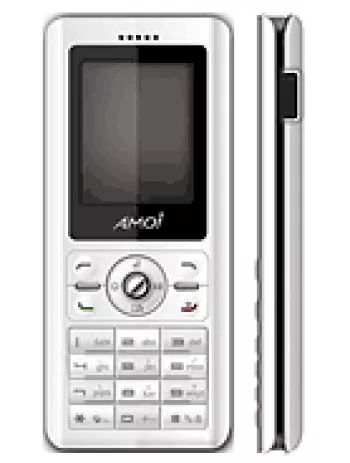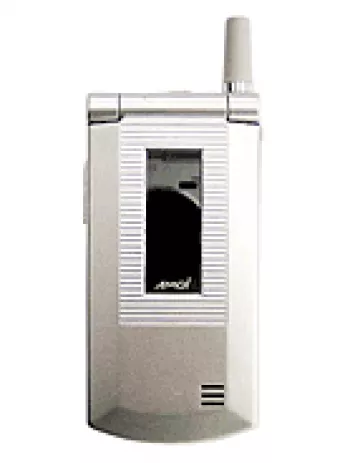
Overview of the Amoi M636
The Amoi M636, announced in the second quarter of 2006, presents itself as a feature phone that was typical of its era. Despite being discontinued now, it is remembered for its charming simplicity. The device offers basic functionalities suitable for users not seeking the complexities of modern smartphones. With its compact dimensions, it fits easily in the hand and the pocket, making it a practical choice for essential mobile communication technology.
Network Capabilities
Operating on GSM technology, the Amoi M636 supports 2G networks, specifically the 900, 1800, and 1900 MHz bands. It provides GPRS class 10 for data communication but lacks EDGE technology, which limits its data speeds significantly compared to later mobile generations. These capabilities were adequate for basic texting and light browsing through the WAP 2.0 browser, which was standard at the time.
Design and Build
With a dimension of 107 x 47 x 18 mm and weighing in at 97 grams, the Amoi M636 is lightweight and easy to handle. The device is built to house a Mini-SIM, which was common for feature phones during its time. Its design is straightforward, focusing on practicality rather than aesthetics, with a plastic body that is durable and resists minor scratches and falls.
Display Features
The phone sports a 2.0-inch TFT display capable of showing 256K colors. The resolution stands at 176 x 220 pixels, resulting in a pixel density of approximately 141 ppi. While this might seem low compared to today's standards, it was typical for feature phones in 2006. The small screen size contributes to its extended battery life, as less power is required to light up the display.
Camera
Surprisingly, the Amoi M636 is equipped with a 2 MP main camera, complemented by an LED flash, which was modest for its time. It facilitates basic photography and video recording, which were novel capabilities for many feature phones back then.
Sound and Audio
The Amoi M636 includes stereo speakers that provide adequate audio output, although it lacks a 3.5mm audio jack, which means users cannot connect standard headphones. For alerts, the phone supports vibration as well as downloadable polyphonic, MP3, and MIDI ringtones, giving users the ability to customize their notification sounds.
Memory and Storage
In terms of storage, the device features 128MB of internal memory, which may seem minimal by current standards, but was sufficient for storing contacts and messages. It lacks an external card slot, limiting users to the internal storage capacity. The phonebook can store up to 500 entries, allowing a significant number of contacts to be saved, along with 20 records each for dialed, received, and missed calls.
Communication and Connectivity
This device does not support modern connectivity options like Wi-Fi or Bluetooth, which means file transfer and media sharing would be limited to wired connections via its miniUSB port or through MMS. FM radio is available, providing users with entertainment options through broadcast radio channels.
Battery Performance
The Amoi M636 houses a removable Li-Ion 720 mAh battery. Despite its limited capacity, the phone's power efficiency results in a standby time of up to 150 hours and talk time of approximately 5 hours. This long battery life is a hallmark of feature phones, as they do not run power-intensive applications.
Software and User Interface
Running on firmware typical of feature phones, the user interface of the M636 is minimal and intuitive. Messaging includes SMS and MMS capabilities, which were the standard modes of text communication back then. Without support for Java, the gaming options are restricted to built-in games that are simple yet entertaining.
Conclusion
In summary, the Amoi M636 represents an era of mobile phones that prioritized call and message functionalities over multimedia and connectivity features. With its straightforward and durable design, this feature phone served its users by focusing on essential communication without the distractions of modern smartphone capabilities.
Key Features of Amoi M636
- Compact and lightweight design with dimensions of 107 x 47 x 18 mm and weighing only 97 g.
- Vibrant 2.0-inch TFT display with 256K colors provides a clear and colorful viewing experience.
- 2 MP rear camera with LED flash for basic photography needs.
- Offers a phonebook capacity of 500 entries, suitable for storing essential contacts.
- Includes a stereo loudspeaker for enhanced audio experience.
- Supports FM radio for on-the-go music and news.
- Equipped with a removable Li-Ion 720 mAh battery, providing up to 150 hours of standby and 5 hours of talk time.
- Available in elegant Silver and Black color options.
Amoi M636 Drawbacks
- Lacks EDGE support for faster internet connectivity.
- Discontinued and no longer available for purchase.
- No expandable memory card slot; limited to 128MB internal memory.
- Limited phonebook capacity, only 500 entries.
- No selfie camera for front-facing photos.
- No 3.5mm headphone jack available.
- Absence of WiFi and Bluetooth connectivity.
- No GPS functionality for navigation.
- Limited browser functionality with WAP 2.0 browser only.
- Does not support Java applications.

View Also
More Phones
All Rights Reserved +13674 Phones © Mobilawy 2025
























